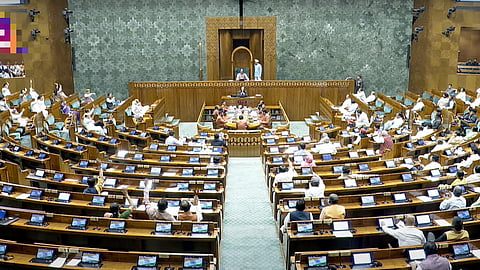

NEW DELHI: The government introduced a bill seeking to streamline various services related to immigration and foreigners, including their entry, exit and stay in the country, in the Lok Sabha on Tuesday.
Rejecting suggestions that Parliament lacked the legislative competence to bring the Immigration and Foreigners Bill, 2025, Minister of State for Home Affair Nityanand Rai said the central government has all the rights under the Union list to bring legislations on the subject.
He said that once the bill is passed, it would replace existing laws including the Passport (Entry into India) Act, 1920, the Registration of Foreigners Act, 1939, the Foreigners Act, 1946, and the Immigration (Carriers’ Liability) Act, 2000.
The objective of the draft bill is to enhance national security, control immigration procedures, and introduce stricter penalties on foreigners, who violate entry and stay conditions, the minister said.
The draft bill also mentions that any foreigner "posing a threat to national security, sovereignty or the integrity of the nation will not be allowed into the country or will be denied the permission to stay in India."
It further mandates registration for foreigners upon arrival, restricting their movement, name changes, and access to protected and restricted areas. Educational institutions, hospitals and nursing homes will have to report of foreign nationals to immigration authorities, it added.
According to the draft bill, violations will attract heavy penalties. “Arriving in India without a valid passport or visa may attract imprisonment of up to five years and a fine of up to Rs 5 lakh. Foreigners using forged documents could face a jail term of two to seven years, with fines ranging from Rs 1 lakh to Rs 10 lakh,” it read.
More to those overstaying, violating visa conditions or trespassing in restricted areas could also result in three years imprisonment and fine of up to Rs 3 lakh.
Transport carriers carrying foreigners without valid documents will be held liable and can be fined up to Rs 5 lakh. It could also lead to potential seizure of their transport if penalties are not paid. If a foreigner is denied entry, the carrier will be responsible for their immediate removal from India.
The bill also gives authority to immigration officers to arrest individuals without a warrant and empowers the central government to regulate the movement of foreigners. Further, it also has provisions to disallow a person from leaving the country, if his or her presence is required by any of the investigative or enforcement agencies.
Opposing the bill at the introduction stage, Manish Tewari (Congress) said the bill is violative of multiple provisions of the Constitution and various laws.
He said the bill violates the principle of fundamental rights and the government may use the provisions of the proposed law to deny entry to those who are not in sync with the ideology of the ruling dispensation of the day.
Saugata Roy of the TMC said the proposed law could prevent inflow of talent from outside in various fields.
In his remarks before formally introducing the bill, Rai said the draft law seeks to correct overlapping and duplicate provisions in prevailing laws governing immigration and foreigners in the country.
The entry, stay and exit of foreigners from India are currently governed by the Registration of Foreigners Act, 1939, and the Foreigners Act, 1946.
While Indian visas of all categories to foreigners can be granted in physical or sticker form by Indian missions or posts located abroad, the Bureau of Immigration (BoI) grants electronic visas under seven categories to people from 167 countries.
Besides, visa-on-arrival is granted by immigration authorities at six designated airports to nationals of three countries -- Japan, South Korea and the UAE (only for such UAE nationals who had earlier obtained e-visa or regular or paper visa for India).
The stay and movement of foreigners in India and their exit are regulated by the BoI, state governments and Union Territory administrations.
According to existing laws, all foreigners on long-term (more than 180 days) visas are required to register with the Foreigners Regional Registration Officer (FRRO) or the Foreigners Registration Officer (FRO) concerned, having jurisdiction over the place where the foreigner intends to stay, within 14 days of arrival.
Pakistani nationals are required to register within 24 hours of their arrival.
Other laws that cover foreigners in India include the Citizenship Act, 1955, which regulates acquisition and termination of Indian citizenship as well as acquisition and registration of foreigners as Overseas Citizens of India (OCI).
The Passports Act, 1967, provides for the issue of passports and travel documents to regulate departure from India of citizens of India and other persons, and the Immigration (Carriers' Liability) Act, 2000, that makes carriers liable in respect of passengers brought by them into India in contravention of provisions of the Passport Act.
Apart from movement, stay and visa, there are certain protected areas in India where foreigners need special permits to travel, including multiple states in the northeastern region, the whole of Andaman and Nicobar, and parts of Jammu and Kashmir, Uttarakhand, Himachal Pradesh and Rajasthan.
According to Union Home Ministry data, a total of 98,40,321 (98.40 lakh) foreigners visited India between April 1, 2023, and March 31, 2024.
(With inputs from PTI)